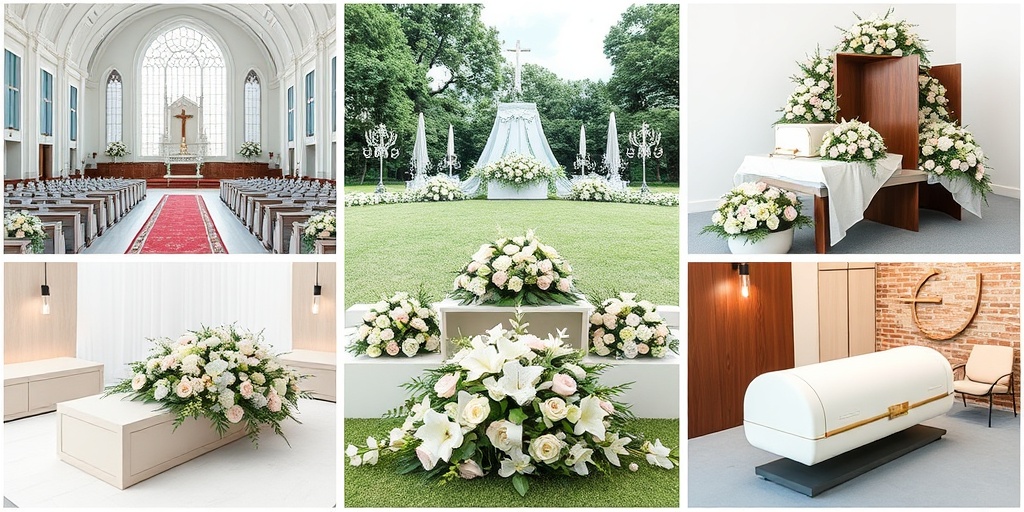What Is Funeral Planning?
Funeral planning is the process of making arrangements for a person’s funeral before they pass away. This can involve a variety of decisions, including selecting a burial or cremation method, choosing a casket or urn, and planning the details of the service itself. By engaging in funeral planning, individuals can ensure that their wishes are honored and that their loved ones are not burdened with difficult decisions during a time of grief.
The Components of Funeral Planning
Funeral planning typically includes several key components:
- Choosing the Type of Service: This can range from a traditional religious service to a more personalized celebration of life.
- Deciding on Burial or Cremation: Families must decide whether to bury or cremate the deceased, which can significantly impact the planning process.
- Selecting a Casket or Urn: Depending on the chosen method, families will need to select an appropriate casket or urn that reflects the deceased’s personality and preferences.
- Planning the Details: This includes choosing music, readings, and speakers for the service, as well as any special tributes or memorials.
Additionally, many people find it helpful to use a funeral planning checklist or funeral planning template to ensure that all aspects are covered. These resources can simplify the process and provide peace of mind.
Importance of Funeral Planning
Engaging in funeral planning is not just about logistics; it carries significant emotional and practical benefits for both the individual and their loved ones. Here are some reasons why funeral planning is essential:
1. Reduces Stress for Loved Ones
One of the most significant advantages of planning ahead is that it alleviates the emotional burden on family members during a challenging time. When a loved one passes away, the last thing they need is to make difficult decisions while grieving. By having a plan in place, families can focus on honoring their loved one rather than getting caught up in the details.
2. Ensures Personal Wishes Are Honored
Funeral planning allows individuals to express their preferences regarding their final arrangements. This can include everything from the type of service to specific songs or readings. By documenting these wishes, individuals can ensure that their desires are respected, providing peace of mind for both themselves and their families.
3. Financial Considerations
Planning ahead can also have financial benefits. By pre-arranging a funeral, individuals can lock in current prices and avoid inflation-related costs in the future. Additionally, many funeral homes offer payment plans or pre-need contracts, which can ease the financial burden on families at the time of death.
4. Facilitates Open Conversations
Discussing funeral plans can foster open communication among family members about death and dying. While these conversations can be uncomfortable, they are essential for ensuring that everyone is on the same page. This transparency can lead to a more supportive environment during a time of loss.
5. Access to Professional Guidance
Many people choose to work with funeral planning services or professionals who can guide them through the process. These experts can provide valuable insights and help families navigate the various options available, ensuring that all aspects of the planning are handled with care and respect.
In conclusion, funeral planning is a thoughtful and proactive approach to managing one of life’s most challenging events. By taking the time to plan ahead, individuals can ease the burden on their loved ones, ensure their wishes are honored, and create a meaningful farewell that reflects their life. For more information and resources on health-related topics, including end-of-life planning, consider visiting Yesil Health AI for evidence-based answers.

Funeral Planning Steps
Planning a funeral can be an emotional and overwhelming task, but breaking it down into manageable steps can help ease the process. Here’s a comprehensive guide to the essential funeral planning steps you should consider:
1. Determine the Type of Service
The first step in funeral planning is deciding on the type of service you want. This could be a traditional funeral, a memorial service, or a celebration of life. Each option has its own unique elements:
- Traditional Funeral: Typically includes a viewing, a service, and burial.
- Memorial Service: A service held without the body present, often more flexible in terms of location and format.
- Celebration of Life: Focuses on celebrating the deceased’s life rather than mourning their death, often featuring personal stories and memories.
2. Create a Funeral Planning Checklist
A funeral planning checklist can help you stay organized and ensure that no detail is overlooked. Here are some key items to include:
- Choose a funeral home or service provider.
- Decide on burial or cremation.
- Select a casket or urn.
- Plan the service details (date, time, location).
- Choose speakers, music, and readings.
- Prepare an obituary.
3. Set a Budget
Funeral costs can vary significantly, so it’s important to set a budget early in the planning process. Consider all potential expenses, including:
- Funeral home fees
- Casket or urn costs
- Transportation
- Flowers and decorations
- Obituary notices
Having a clear budget will help guide your decisions and prevent overspending. 💰
4. Gather Necessary Documents
Ensure you have all the necessary documents ready for the funeral planning process. This may include:
- The deceased’s will
- Life insurance policies
- Military discharge papers (if applicable)
- Identification documents
5. Communicate with Family and Friends
Involving family and close friends in the planning process can provide emotional support and help ensure that the service reflects the wishes of the deceased. Discuss preferences and ideas openly to create a meaningful tribute. 🤝
Types of Funerals
Understanding the different types of funerals available can help you make informed decisions during the planning process. Here are some common options:
1. Traditional Funeral
A traditional funeral typically includes a viewing or wake, a formal service, and burial or cremation. This type of service often follows religious or cultural customs and provides an opportunity for family and friends to gather and pay their respects.
2. Memorial Service
Unlike a traditional funeral, a memorial service is held without the body present. This allows for greater flexibility in terms of location and timing. Memorial services can be personalized to reflect the deceased’s personality and may include music, readings, and shared memories.
3. Graveside Service
A graveside service is a brief ceremony held at the burial site. It often includes a few words from a clergy member or family member and is typically attended by a smaller group of people. This type of service is often less formal and can be a more intimate way to say goodbye.
4. Green Funeral
For those who are environmentally conscious, a green funeral focuses on sustainability and minimizing environmental impact. This may include using biodegradable caskets, natural burial sites, and eco-friendly practices throughout the planning process.
5. Direct Cremation
Direct cremation is a straightforward option where the body is cremated shortly after death, without a formal service beforehand. This option is often more affordable and can be followed by a memorial service at a later date.
Each type of funeral has its own unique characteristics and can be tailored to fit the wishes of the deceased and their family. Understanding these options can help you create a meaningful farewell that honors their life. 🌷

Funeral Costs and Budgeting
Planning a funeral can be an emotionally challenging experience, and understanding the costs involved is crucial for effective funeral planning. The expenses can vary significantly based on several factors, including location, service type, and personal preferences. Here’s a breakdown of what you need to consider when budgeting for a funeral.
Understanding Funeral Costs
Funeral costs can be categorized into several key components:
- Basic Services Fee: This is a standard charge that covers the funeral home’s services, including administrative tasks and coordination of the funeral.
- Transportation Costs: This includes the cost of transporting the deceased to the funeral home and to the final resting place.
- Casket or Urn: The choice of casket or urn can significantly impact the overall cost. Prices can range from a few hundred to several thousand dollars.
- Embalming and Preparation: If you choose to have the body embalmed, this will incur additional costs. Preparation may also include dressing and cosmetology services.
- Funeral Service Fees: This includes the cost of the ceremony, whether it’s held at a funeral home, church, or another venue.
- Burial or Cremation Costs: Depending on your choice, burial plots, headstones, or cremation services will add to the total expenses.
Creating a Funeral Budget
To effectively manage funeral costs, it’s essential to create a detailed budget. Here are some steps to help you:
- Research Costs: Start by researching local funeral homes and their pricing. Many funeral homes provide a funeral planning checklist or a price list upon request.
- Set a Budget: Determine how much you can afford to spend. Consider any pre-existing arrangements or funds that may be available.
- Prioritize Expenses: Identify which elements of the funeral are most important to you and allocate funds accordingly.
- Consider Alternatives: Explore options like direct cremation or memorial services, which can be more cost-effective.
- Utilize a Funeral Planning Template: Using a funeral planning worksheet PDF can help you keep track of expenses and decisions.
By taking the time to budget and plan, you can ensure that the funeral reflects the wishes of your loved one while remaining financially manageable. 💰
Funeral Service Options
When it comes to funeral planning, there are various service options available to honor the deceased. Understanding these options can help you make informed decisions that align with your loved one’s wishes and your family’s needs.
Traditional Funeral Services
A traditional funeral service typically includes a viewing, a formal ceremony, and burial or cremation. Here’s what to expect:
- Viewing: This is an opportunity for family and friends to pay their respects. It usually takes place at the funeral home.
- Funeral Ceremony: A formal service may include religious or personal elements, such as readings, music, and eulogies.
- Burial or Cremation: After the service, the body is either buried in a cemetery or cremated, depending on the family’s wishes.
Memorial Services
Memorial services are similar to traditional funerals but typically occur without the body present. They can be held at various locations, including homes, parks, or community centers. This option allows for a more personalized and less formal gathering.
Direct Cremation
For those looking for a simpler and more cost-effective option, direct cremation involves cremating the body shortly after death without a formal service. Families can later hold a memorial service at their convenience. This option can significantly reduce costs and allows for flexibility in planning.
Green Funerals
As environmental awareness grows, many families are opting for green funerals. These services focus on sustainability and may include:
- Biodegradable Caskets: Made from natural materials that decompose easily.
- Natural Burial Sites: Choosing burial grounds that preserve the natural landscape.
- Minimal Environmental Impact: Reducing the use of chemicals and non-biodegradable materials.
Choosing the right funeral service option is a deeply personal decision. It’s essential to consider the wishes of the deceased, the needs of the family, and the budget available. By exploring various options, you can create a meaningful tribute that honors your loved one’s life. 🌷

Legal Considerations in Funeral Planning
When it comes to funeral planning, understanding the legal aspects is crucial. This ensures that your wishes are honored and that the process runs smoothly for your loved ones during a difficult time. Here are some key legal considerations to keep in mind:
Understanding Funeral Laws
Each state has its own laws regarding funerals, including regulations on burial, cremation, and the handling of remains. Familiarizing yourself with these laws can help avoid complications later. For instance, some states require a death certificate before burial or cremation can take place. It’s essential to check with local authorities or a funeral planning center to ensure compliance.
Choosing a Funeral Home
When selecting a funeral home, it’s important to understand your rights as a consumer. The Funeral Rule, enforced by the Federal Trade Commission (FTC), mandates that funeral homes provide clear pricing information and allow you to choose only the services you want. This transparency helps you make informed decisions without feeling pressured.
Pre-Need vs. At-Need Planning
Funeral planning can be categorized into two types: pre-need and at-need. Pre-need planning involves making arrangements in advance, often including financial aspects like purchasing a funeral plan. This can alleviate the burden on your family during a time of grief. On the other hand, at-need planning occurs when a death has already occurred, requiring immediate decisions. Understanding the differences can help you choose the best approach for your situation.
Legal Documents to Consider
Several legal documents are essential in the funeral planning process:
- Will: This document outlines your wishes regarding your estate and can include funeral arrangements.
- Power of Attorney: Designating someone to make decisions on your behalf can be crucial, especially if you have specific wishes.
- Funeral Planning Declaration: This document explicitly states your preferences for your funeral, ensuring they are honored.
Having these documents in place can provide peace of mind and clarity for your loved ones during a challenging time. 🕊️
Personalizing the Funeral Experience
Funerals are a time to celebrate life and honor the deceased. Personalizing the funeral experience can make it more meaningful for family and friends. Here are some ways to create a unique and memorable service:
Incorporating Personal Touches
Consider including elements that reflect the personality and interests of the deceased. This could be:
- Favorite Music: Play songs that were significant to the individual, creating a comforting atmosphere.
- Photo Displays: Set up a slideshow or a memory board showcasing cherished moments from their life.
- Personalized Eulogies: Encourage family and friends to share stories and memories that highlight the deceased’s character.
Choosing a Theme
Some families opt for a theme that resonates with the deceased’s passions or hobbies. For example, if they loved gardening, you might incorporate floral arrangements that reflect their favorite blooms. If they were an avid traveler, consider using maps or travel memorabilia as decor. 🌍
Unique Venue Options
While traditional funeral homes are common, think outside the box when it comes to venues. Hosting the service in a location that held special meaning for the deceased—such as a park, beach, or community center—can create a more intimate and personal experience.
Memorial Keepsakes
Providing guests with memorial keepsakes can help them remember the deceased fondly. Consider options like:
- Customized Programs: Include photos and meaningful quotes in the funeral program.
- Memory Books: Allow guests to write down their memories and messages for the family.
- Personalized Tokens: Items like engraved keychains or bookmarks can serve as lasting reminders.
By personalizing the funeral experience, you not only honor the deceased but also create a supportive environment for those grieving. This thoughtful approach can help foster healing and connection among family and friends. 💖

Frequently Asked Questions about Funeral Planning
What is Funeral Planning?
Funeral planning involves making arrangements for a person’s funeral before their passing. This can include decisions about the type of service, burial or cremation, and other details to ensure that the wishes of the deceased are honored.
Why is Funeral Planning Important?
Planning a funeral in advance can alleviate stress for family members during a difficult time. It allows individuals to express their preferences and ensures that their wishes are respected, making the process smoother for loved ones.
What Should be Included in a Funeral Planning Checklist?
A comprehensive funeral planning checklist typically includes:
- Type of service (traditional, memorial, etc.)
- Burial or cremation preferences
- Location of the service
- Guest list
- Obituary details
- Budget considerations
Are There Funeral Planning Templates Available?
Yes, there are various funeral planning templates available online. These templates can help guide you through the process and ensure that all necessary details are covered.
What is a Funeral Planning Worksheet?
A funeral planning worksheet is a document that helps individuals organize their thoughts and preferences regarding funeral arrangements. It can include sections for personal information, service details, and financial considerations.
How Can I Find Funeral Planning Services?
To find funeral planning services, you can search online for local funeral homes or planning centers. Many offer comprehensive services to assist with all aspects of funeral planning.
What is a Funeral Planning Declaration?
A funeral planning declaration is a legal document that outlines an individual’s wishes regarding their funeral arrangements. This declaration can help ensure that your preferences are followed after your passing.
Where Can I Get a Funeral Planning Book?
Funeral planning books can be found at local bookstores, libraries, or online retailers. These books often provide valuable insights and guidance on how to navigate the planning process.
Is There a Funeral Planning Worksheet PDF Available?
Many websites offer free downloadable funeral planning worksheet PDFs. These resources can be very helpful in organizing your thoughts and preferences in a structured format.
How Can I Start My Funeral Planning?
To begin your funeral planning, consider writing down your preferences regarding the type of service, burial or cremation, and any specific wishes you have. Consulting with family members can also provide valuable input and support.




